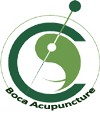Acupuncture has been used to treat frequent and urgent urination for thousands of years in China. In the modern world, Enlarged prostate with elevated PSA has been studied by some researchers to verify that electrical acupuncture can reduce the night frequent and urgent urination so patient can sleep deeper and reduce the inflammation. One study, by Ricci et al., found that electroacupuncture (EA) had better effects in decreasing the number of voiding times with urinary urgency that persisted after transurethral resection of the prostate. In another study, Philp et al found that acupuncture increased the bladder capacity of patients with bladder instability.
Yang Wang et al. added further evidence for the use of acupuncture for patients with BPH. Their research results indicated that the IPSS (The International Prostate Symptom Score has been used to evaluate the symptoms of benign prostatic hyperplasia (BPH), the higher the score is, the worse the symptoms are) was decreased by 7.26 and 2.34 in a BL33 acupoints electrical stimulation group and the non-point EA group respectively. Studies have demonstrated that balancing the nerves, which control the bladder, can improve symptoms of overactive bladder. Acupuncture had better results than terazosin in this study. Also, in their pilot trial, 40 patients were randomized into the treatment group (BL33) and the control group (non-point acupuncture site located beside BL33). The results showed that electroacupuncture at BL33 had a better effect in reducing IPSS and bladder residual urine and increasing maximum urinary flow rate than electroacupuncture at non-point. There is significant improvement with urinary frequency, especially at night, in the treatment group as compared with the control group.
Boca Acupuncture
1599 NW 9th Ave, Boca Raton, FL | Phone: 561-235-3645







